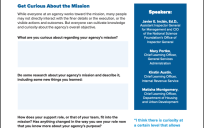Spending time on professional self-care doesn’t mean you are selfish or have failed in some way. Working for the government can be hard. Some days, really hard. You do self-care because you deserve to feel better every day, not just on the good ones.
There’s a lot about work that self-care can’t fix. Breathing exercises won’t convince an overbearing boss to chill out, and bubble baths won’t make a coworker’s microaggressions less hurtful. However, unless you’re planning a career change, you’ve got to find ways to cope with what the workday throws at you.
Let’s dive in and explore self-care strategies that can help you have a more positive experience at work.
Focus on What You Can Control
As the saying goes, “Not my circus, not my monkeys.” It’s easy to get caught up in responsibilities that aren’t yours. Or you might struggle to meet the unreasonable expectations people impose on you — or that you impose on yourself. And let’s not forget the exhausting workplace dramas that devour energy like a black hole.
To truly take care of yourself at work, you need to learn to let go of what isn’t within your control so you can focus on what is. Letting go is a way to free up your time, skills, and resources so you spend them on what deserves your attention.
Letting go takes practice. Start by no longer worrying about what you don’t have authority over. If it’s not your responsibility, put it out of your mind. Then try being more forgiving to yourself by not allowing perfection get in the way of getting things done well enough. Show kindness to others and yourself by letting go of resentment, jealousy, impatience, grudges, and other negative burdens.
Turn Your Attention Outward
Connecting with others can provide comfort on our worst days and give us people with whom to celebrate on our best days. This kind of community care is an important form of self-care.
Even if you prefer to keep relationships purely professional in the office, you can still establish beneficial connections with coworkers. Show compassion to your colleagues when they’re struggling, offer advice if you have relevant experience or ideas, and congratulate them when they’ve been successful. Even the simple act of listening to someone as they reflect on a challenging situation can make a difference.
If you’re in a supportive workplace, see if you can connect with affinity groups beyond your team. You may discover identity-based networks, like those based on race, gender, or disability. Join a coworker community that does activities together, such as hiking or gaming, or start it if one doesn’t exist. You could also check if there are support groups for people experiencing similar sources of stress, like parents, caregivers, veterans, or people dealing with health challenges.
Choose a Relaxing Ritual
It’s human nature that we’re drawn to rituals. It’s why people gather together for holidays and enjoy a morning cup of coffee. Research shows rituals can have a positive effect on mental health.
One way to make a ritual deliver a self-care boost is to pay attention. Savor it. Linger over it. Be in the moment. Unlike a routine, which are tasks you do on autopilot, a relaxing ritual should cause you to take notice. Laugh at a ridiculous cat video. Text a friend a photo of a beautiful flower you saw on a walk. Journal about something a coworker did that you’re grateful for. Take a few minutes to stretch out the stiffness in your body.
You can even repurpose things from your regular routine into rituals, as long as they help you relax. At work, you might clear your desk of distracting clutter, enjoy a healthy snack, or make tomorrow’s to-do list. At home, you might mindfully cook, clean, or exercise so you don’t think about work. Just remember, whatever your ritual, do it with awareness and intentionality so it is a source of self-care.
Get Healthy Sleep
Being tired is terrible for your well-being. It can make it harder to think clearly, concentrate, and make decisions. The irritability that comes from poor sleep can earn you a reputation as the office grouch. Even if you don’t have time for all the sleep you crave, you can make changes so the sleep you do get is more refreshing and restorative.
Give some of these techniques a try: Avoid caffeine after noon and alcohol after dinner. Aim to go to bed around the same time every day. At least an hour before bed, turn off your TV and shut down your computer. Turn off phone notifications and keep your phone out of reach so you’re less tempted to pick it up.
If you’re a light sleeper, try using a phone app or machine that produces white noise, which can make other sounds less noticeable so you don’t wake up. Some people prefer the soothing sound of a room fan or recordings of wind, waves, or rain.
Lauren Girardin is a marketing and communications consultant, storyteller, and freelance writer based in San Francisco. She helps organizations engage their communities and tell their stories. Her website is laurengirardin.com and you can connect with her on Twitter at @girardinl.





Leave a Reply
You must be logged in to post a comment.